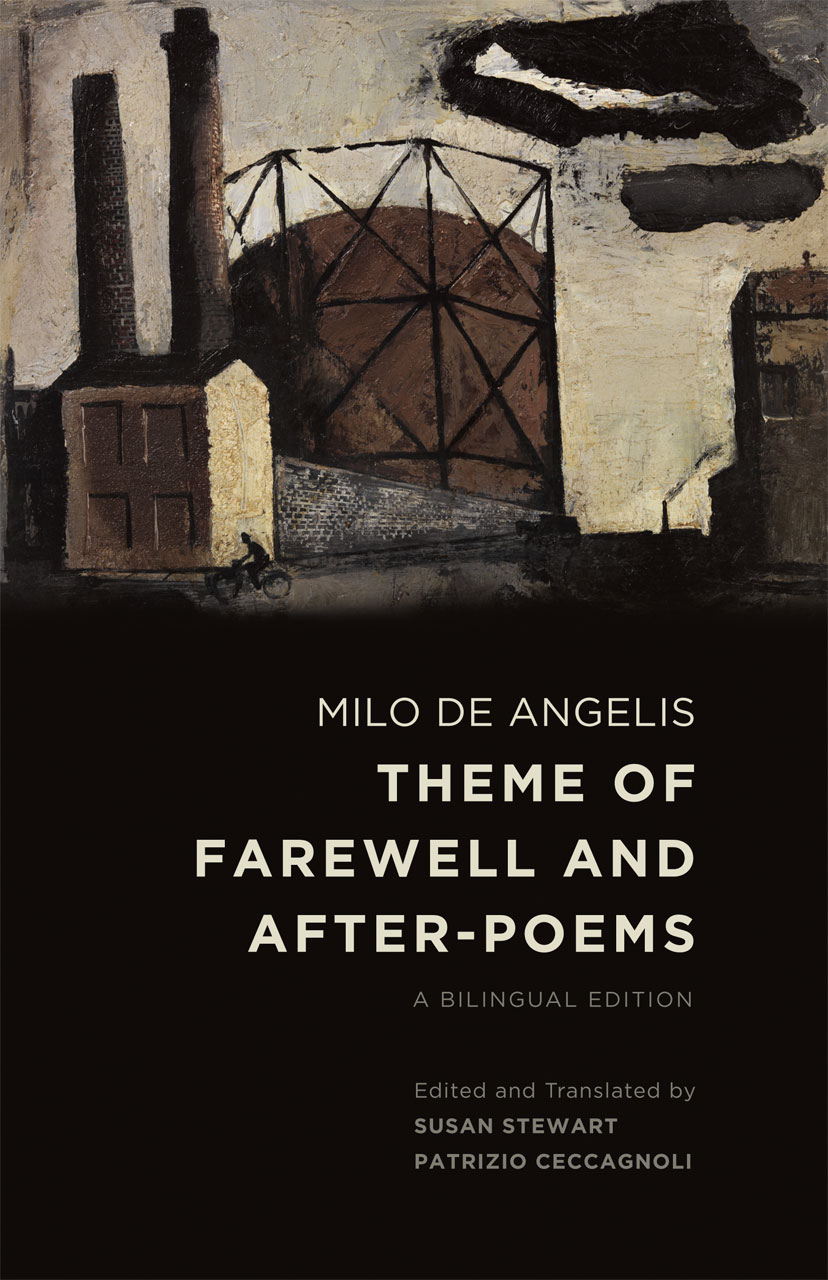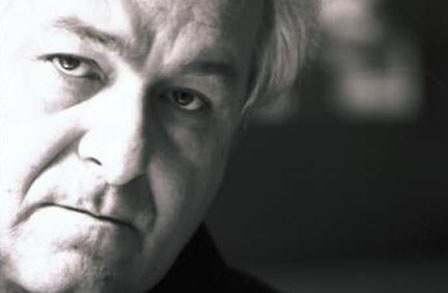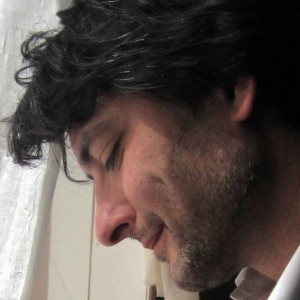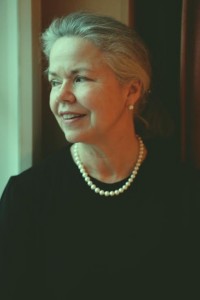 Pubblicato e tradotto da Susan Stewart e Patrizio Ceccagnoli
Pubblicato e tradotto da Susan Stewart e Patrizio Ceccagnoli
168 pagine | 5-1 / 2 x 8-1 / 2 | © 2013 University Chicago Press
Milo De Angelis, nato nel 1951, è uno dei più importanti poeti italiani viventi. Con questo volume, Susan Stewart e Patrizio Ceccagnoli portano per la prima volta ai lettori inglesi un’edizione con traduzione a fronte del suo lavoro più recente: la sua elegia Tema dell’addio e la successiva raccolta di poesia Quell’andarsene nel buio dei cortili.
Questi due libri costituiscono una sequenza che narra la malattia e la morte prematura nel 2003 della moglie del poeta, la scrittrice Giovanna Sicari, e tracciano il percorso compiuto dallo stesso De Angelis nel tempo dal dolore al mondo. Immediate, percettive e intessute nella vita quotidiana della Milano contemporanea, le poesie non prendono mai le distanze dalle emozioni umane della disperazione e del risveglio. Durante la sua lunga carriera, De Angelis ha rinnovato la lirica della sua poesia con l’intensità di forme ed intuizioni che lo hanno portato a vincere alcuni dei più importanti riconoscimenti letterari italiani, tra cui il Premio Viareggio.
Queste inesorabili e eccellenti traduzioni saranno di grande interesse per gli studiosi e gli appassionati della letteratura contemporanea italiana e in particolare della poesia e della traduzione letteraria nonché per coloro che si occupano di studi di letteratura comparata. Ma soprattutto parlano a qualunque lettore che sia alla ricerca di un poeta che scrive al massimo della sua forza espressiva.
_____
Edited and Translated by Susan Stewart and Patrizio Ceccagnoli
168 pages | 5-1/2 x 8-1/2 | © 2013
 Milo De Angelis, born in 1951, is one of the most important living Italian poets. With this volume, Susan Stewart and Patrizio Ceccagnoli bring to English readers for the first time a facing-page edition of his most recent work: his book-length elegy, Theme of Farewell, and the subsequent poems of That Wandering in the Darkness of Courtyards. These two books form a sequence narrating the illness and premature death, in 2003, of the poet’s wife, the writer Giovanna Sicari, a celebrated poet in her own right; they also trace De Angelis’s turn from grief, through time, back to the world. Immediate, perceptive, and woven from the fabric of everyday life in contemporary Milan, the poems never depart from universal human emotions of despair and awakening. Throughout his long career, De Angelis has renewed lyric poetry with the sheer intensity of his forms and insights, and the volumes offered here have won some of the most important Italian literary awards, including the coveted Premio Viareggio.
Milo De Angelis, born in 1951, is one of the most important living Italian poets. With this volume, Susan Stewart and Patrizio Ceccagnoli bring to English readers for the first time a facing-page edition of his most recent work: his book-length elegy, Theme of Farewell, and the subsequent poems of That Wandering in the Darkness of Courtyards. These two books form a sequence narrating the illness and premature death, in 2003, of the poet’s wife, the writer Giovanna Sicari, a celebrated poet in her own right; they also trace De Angelis’s turn from grief, through time, back to the world. Immediate, perceptive, and woven from the fabric of everyday life in contemporary Milan, the poems never depart from universal human emotions of despair and awakening. Throughout his long career, De Angelis has renewed lyric poetry with the sheer intensity of his forms and insights, and the volumes offered here have won some of the most important Italian literary awards, including the coveted Premio Viareggio.
These inexorable and beautifully crafted translations will be of interest to scholars of contemporary Italian literature, students of contemporary poetry and literary translation, and those who work in comparative literature. Above all, they are bound to speak to any reader in search of a poet writing at the height of his powers of expression.
Milo De Angelis
Translated by S/ Stewart and P. Ceccagnoli
da Tema dell’addio (2005)
from Theme of Farewell
Milano era asfalto, asfalto liquefatto. Nel deserto
di un giardino avvenne la carezza, la penombra
addolcita che invase le foglie, ora senza giudizio,
spazio assoluto di una lacrima. Un istante
in equilibrio tra due nomi avanzò verso di noi,
si fece luminoso, si posò respirando sul petto,
sulla grande presenza sconosciuta. Morire fu quello
sbriciolarsi delle linee, noi lì e il gesto ovunque,
noi dispersi nelle supreme tensioni dell’estate,
noi tra le ossa e l’essenza della terra.
Milan was asphalt, liquid asphalt. In the desert
of a garden, there was a caress, the melting
penumbra invading the leaves, the hour without censure,
a tear’s absolute space. An instant,
balanced between two names, came toward us,
luminous, settling, breathing, on the chest
of the great unknown presence. To die was that
crumbling of lines, we were there and the gesture was everywhere,
we were scattered in the high tensions of summer
we were caught between the bones and the essence of the earth.
***
Non è più dato. Il pianto che si trasformava
in un ridere impazzito, le notti passate
correndo in Via Crescenzago, inseguendo il neon
di un’edicola. Non è più dato. Non è più nostro
il batticuore di aspettare mezzanotte, aspettarla
finché mezzanotte entra nel suo vero tumulto,
nella frenesia di tutte le ore, di tutte le ore.
Non è più dato. Uno solo è il tempo, una sola
la morte, poche le ossessioni, poche
le notti d’amore, pochi i baci, poche le strade
che portano fuori di noi, poche le poesie.
Nothing more can be done. The crying that turned
into crazy laughing, the nights spent
running down Via Crescenzago, chasing the neon
banner of a newsstand. Nothing more can be done. It’s no longer ours,
the heartbeat of waiting for midnight, waiting for her
until midnight enters with its true tumult,
with the frenzy of all the hours, all the hours.
Nothing more can be done. There’s only one time, only one
death, a few obsessions, a few
nights of love, a few kisses, a few streets
that lead outside ourselves, a few poems.
***
Tutto era già in cammino. Da allora a qui. Tutto
il tempo, luminoso, sfiorava le labbra. Tutti
i respiri si riunivano nella collana. Le ombre
di Lambrate chiusero la porta. Tutta la stanza,
assorta, diventò il primo battito. Il nero
dei tuoi capelli contro il giallo dell’ultimo raggio.
Da allora a qui. Era il primo giorno dell’estate.
Il silenzio ci riempiva la fronte. Tutto era
già in cammino, da allora, tutto era qui, unico
e perduto, nostro e remoto. Tutto chiedeva
di essere atteso, di tornare nel suo vero nome.
Everything was already on its way. From then to here. All
of time, luminous, skimmed across the lips. All
the sighs strung on the necklace. Lambrate’s
shadows shut the door. The whole room
taken in, became the first heartbeat. The black
of your hair against the yellow of the last sunbeams.
From then to here. It was the first day of summer.
The silence filled our thoughts. Everything was
already on its way, from then on, everything was here, unique
and lost, ours and far from us, burning. Everything asked
us to wait for it, to return to its true name.
***
Quando su un volto desiderato si scorge il segno
di troppe stagioni e una vena troppo scura
si prolunga nella stanza, quando le incisioni
della vita giungono in folla e il sangue rallenta
dentro i polsi che abbiamo stretto fino all’alba,
allora non è solo lì che la grande corrente
si ferma, allora è notte, è notte su ogni volto
che abbiamo amato.
When on a beloved face you catch a glimpse of the sign
of too many seasons and a vein, much too dark,
stretches out into the room, when life’s
cuts well up, a host of them, and the blood slows
inside the wrists that we’ve held tight until dawn,
it’s not only there that the swelling current
stops, then it is night, it is night on every face
we have loved.
***
da Quell’andarsene nel buio dei cortili (2010)
Era buio. Il centro di agosto era buio
come il corpo nudo. Non potevo
trovare riposo né movimento: solo il battere
del sangue sulle labbra. Il buio
giungeva dal respiro aperto, dalla freccia alata
che entra nel mondo. Il buio
era lì. Era lì, nel vertice
della prima caduta, era me stesso,
questo freddo che, oltre i secoli, mi parla.
It was dark. August was dark at its center
like a naked body. I could not find
rest or motion; only the blood
throbbing at the lips. The dark
arrived from the open breath, from the winged
arrow that penetrates the world. The dark
was there. It was there, in the vertex
of the first fall, it was myself,
this cold that, beyond centuries, speaks to me.
***
Ecco l’acrobata della notte, il corpo
senza nulla, un’incisione
nell’aria, un puro scoccare
di fosfori: gettò il suo smeraldo
all’ultima fortuna, si avvicinò ai sepolti,
indicò a ciascuno la strada. La terra appartiene
a chi l’ha abbandonata.
Here is night’s acrobat, the body
without anything, an incision
in the air, a pure burst
of phosphorus: the emerald was pitched
at the last chance, came toward them in their graves,
pointed out the way to each. The land belongs
to those who forsook it.
Susan Stewart ha pubblicato sei libri di poesia, tra cui Colombarium, vincitore del National Book Critics Circle Award, e Cinder: New and Selected Poems, in uscita con Graywolf Press nel 2017. La Stewart ha ricevuto la prestigiosa MacArthur Fellowship (1997) ed è stata insignita dall’American Academy of Arts and Letters con l’American Award in Letteratura. Tra gli altri onori ricevuti, l’elezione a Chancelor dell’Academy of American Poets (2005) e il Berlin Prize Award nel 2014. Susan Stewart insegna alla Princeton University, dove è Avalon Foundation University Professor in the Humanities e dirige la Princeton Series of Contemporary Poets.
Susan Stewart is the author of six books of poetry, including Columbarium, winner of the National Book Critics Circle Award and Cinder: New and Selected Poems, forthcoming in 2017 from Graywolf Press. A former MacArthur Fellow and Chancellor of the Academy of American Poets, she also has received an Academy Award in Literature from the American Academy of Arts and Letters; in 2014 she was a Berlin Prize Fellow. She teaches at Princeton University, where she is Avalon Foundation University Professor in the Humanities and editor of the Princeton Series of Contemporary Poets.
 Patrizio Ceccagnoli è Assistant Professor di Italiano all’Università del Kansas. Nel 2013 ha pubblicato con Paolo Valesio la prima edizione del romanzo postumo di F. T. Marinetti, Venezianella e Studentaccio (Mondadori). Theme of Farewell, co-tradotto con Susan Stewart, ha ricevuto un premio da parte del Ministero degli Esteri Italiano e, unico dall’italiano, è stato nella cinquina finalista per l’American Literary Translators Association: ALTA-National Translation Award 2014.
Patrizio Ceccagnoli è Assistant Professor di Italiano all’Università del Kansas. Nel 2013 ha pubblicato con Paolo Valesio la prima edizione del romanzo postumo di F. T. Marinetti, Venezianella e Studentaccio (Mondadori). Theme of Farewell, co-tradotto con Susan Stewart, ha ricevuto un premio da parte del Ministero degli Esteri Italiano e, unico dall’italiano, è stato nella cinquina finalista per l’American Literary Translators Association: ALTA-National Translation Award 2014.
Ceccagnoli collabora da anni alla rivista “Italian Poetry Review” e ha tradotto poesie di Anne Carson, Stephen Dunn (Pulitzer 2001), Edoardo Sanguineti e Paolo Valesio.
Patrizio Ceccagnoli is an Assistant Professor of Italian at The University of Kansas. In 2013, Ceccagnoli published, in collaboration with Paolo Valesio, the first critical edition of Marinetti’s novel Venezianella e Studentaccio (Mondadori). In collaboration with Susan Stewart, he translated the last two books of poetry written by Milo De Angelis, Theme of Farewell and After-Poems (University of Chicago Press, 2013), which was nominated for the American Literary Translators Association Award in 2014. He is a managing editor of Italian Poetry Review. Ceccagnoli has translated poems by Anne Carson, Stephen Dunn (Pulitzer 2001) Edoardo Sanguineti, and Paolo Valesio.

